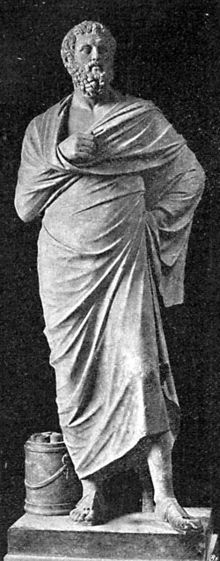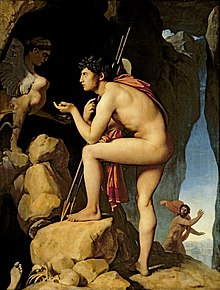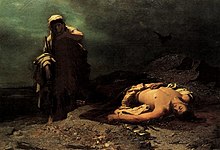Loading AI tools

Sophocles (Greek: Σοφοκλῆς; 496 – 406 BCE) was a Greek playwright, dramatist, priest, and politician of Classical Athens. He was also a general for the Athenian Empire in the Peloponnesian Wars, and during his service he led the battle against the Peloponnesian Island of Samos.[citation needed]
- When ice appears out of doors, and boys seize it up while it is solid, at first they experience new pleasures. But in the end their pride will not agree to let it go, but their acquisition is not good for them if it stays in their hands. In the same way an identical desire drives lovers to act and not to act.
- Achilles' Loves, only surviving fragment, often quoted as: "Love is like ice in the hands of children."
- A lie never lives to be old.
- Acrisius, fragment 59.
- No man loves life like him that's growing old.
- Acrisius, fragment 64.
- A short saying often contains much wisdom.
- Aletes, fragment 99.
- Truly, to tell lies is not honorable;
But when the truth entails tremendous ruin,
To speak dishonorably is pardonable.- Creusa, fragment 323.
- Do nothing secretly; for Time sees and hears all things, and discloses all.
- Hipponous, fragment 280.
- Heaven ne'er helps the men who will not act.
- Fragment 288. (Plumptre's translation, as cited in Bartlett's Familiar Quotations, 1906)
- Variant: Heaven never helps the man who will not act.
- "How about your service of Aphrodite, Sophocles—is your natural force still unabated?" And he replied, 'Hush, man, most gladly have I escaped this thing you talk of, as if I had run away from a raging and savage beast of a master."
- Plato, Republic, 1.329c. Translated by Paul Shorey.
- If ills you do, ills also you must bear.
- quoted in To Autolycus, Book II, Ch. XXXVII by Theophilus of Antioch
Phædra
- Children are the anchors of a mother's life.
- Fragment 685.
- The truth is always the strongest argument.
- Fragment 737.
- The dice of Zeus fall ever luckily.
- Fragment 809.
- Fortune is not on the side of the faint-hearted.
- Fragment 842.
- No oath can be too binding for a lover.
- Fragment 848.
- Thoughts are mightier than strength of hand.
- Fragment 854.
- στέργειν δέ τάκπεσόντα καί θέσθαι πρέπει σοφόν κυβευτήν, ’αλλά μη στένειν τύχην
- A wise player ought to accept his throws and score them, not bewail his luck.
- Phaedra: Fragment 947.
- A. C. Pearson, The Fragments of Sophocles (with additional notes from the papers of Sir R. C. Jebb and W. G. Headlam), Vol. 3 (Cambridge: Cambridge University Press, 1917)
- A wise player ought to accept his throws and score them, not bewail his luck.
Ajax
- ἀλλ᾽ ἢ καλῶς ζῆν ἢ καλῶς τεθνηκέναι
τὸν εὐγενῆ χρή- Nobly to live, or else nobly to die,
Befits proud birth.- Lines 479-480
- Nobly to live, or else nobly to die,
- Of all human ills, greatest is fortune's wayward tyranny.
- Line 486
- Ὦ παῖ, γένοιο πατρὸς εὐτυχέστερος,
τὰ δ᾽ ἄλλ᾽ ὅμοιος: καὶ γένοι᾽ ἂν οὐ κακός- Ah, son, may you prove luckier than your father, but in all else like him. Then you would not prove base.
- Ajax, lines 550-551; English translation by Richard Jebb
- Ah, son, may you prove luckier than your father, but in all else like him. Then you would not prove base.
- χάρις χάριν γάρ ἐστιν ἡ τίκτουσ᾽ ἀεί
ὅτου δ᾽ ἀπορρεῖ μνῆστις εὖ πεπονθότος,
οὐκ ἂν γένοιτ᾽ ἔθ᾽ οὗτος εὐγενὴς ἀνήρ.- For kindness begets kindness evermore,
But he from whose mind fades the memory
Of benefits, noble is he no more.- Lines 522-524 (tr. R. C. Trevelyan)
- For kindness begets kindness evermore,
- Men of ill judgement oft ignore the good
That lies within their hands, till they have lost it.- Line 964
Oedipus Rex

He solved the famous riddle, with his brilliance,
he rose to power, a man beyond all power.
Who could behold his greatness without envy?
- How dreadful knowledge of the truth can be
When there's no help in truth!- Variant: Wisdom is a curse when wisdom does nothing for the man who has it.
- Line 316.
- I will never reveal my dreadful secrets, or rather, yours.
- Variant: I will not wound myself nor thee. Why seek
To trap and question me? I will not speak. - Variant: Nay, I see that thou, on thy part, openest not thy lips in season: therefore I speak not, that neither may I have thy mishap.
- Teiresias (Line 332?).
- Variant: I will not wound myself nor thee. Why seek
- The tyrant is a child of Pride
Who drinks from his sickening cup
Recklessness and vanity,
Until from his high crest headlong
He plummets to the dust of hope.- Line 872.
- Fear? What has a man to do with fear? Chance rules our lives, and the future is all unknown. Best live as we may, from day to day.
- Variant: Nay, what should mortal fear, for whom the decrees of fortune are supreme and who hath clear foresight of nothing? 'Tis best to live at random, as one may.
- Jocasta (Line 1069).
- I am the child of Fortune,
The giver of good, and I shall not be shamed.
She is my mother; my sisters are the Seasons;
My rising and my falling match with theirs.
Born thus, I ask to be no other man
Than that I am, and will know who I am.- Lines 1080-1085. Translated by E. F. Watling in Sophocles: The Theban Plays published by Penguin Books.
- Variant: I am Fortune's child,
Not man's; her mother face hath ever smiled
Above me, and my brethren of the sky,
The changing Moons, have changed me low and high.
There is my lineage true, which none shall wrest
From me; who then am I to fear this quest?
- The greatest griefs are those we cause ourselves.
- Line 1184, Second Messenger; one commonly quoted translation is, "The keenest sorrow is to recognize ourselves as the sole cause of all our adversities".
- Time eases all things.
- Line 1515.
- Let every man in mankind's frailty
Consider his last day; and let none
Presume on his good fortune until he find
Life, at his death, a memory without pain.- Variant: Look upon him, O my Thebans, on your king, the child of fame!
This mighty man, this Œdipus the lore far-famed could guess,
And envy from each Theban won, so great his lordliness—
Lo to what a surge of sorrow and confusion hath he come!
Let us call no mortal happy till our eyes have seen the doom
And the death-day come upon him—till, unharassed by mischance,
He pass the bound of mortal life, the goal of ordinance.
[Tr. E. D. A. Morshead (1885)] - Variant: People of Thebes, my countrymen, look on Oedipus.
He solved the famous riddle, with his brilliance,
he rose to power, a man beyond all power.
Who could behold his greatness without envy?
Now what a black sea of terror has overwhelmed him.
Now as we keep our watch and wait the final day,
count no man happy till he dies, free of pain at last.
[quoted by Thomas Cahill in Sailing the Wine-Dark Sea] - Line 1529, Choragos.
- Variant: Look upon him, O my Thebans, on your king, the child of fame!
Antigone

- For God hates utterly
The bray of bragging tongues.- Line 123
- Our ship of fate, which recent storms have threatened to destroy, has come safely to harbor at last.
- Line 163
- I have nothing but contempt for the kind of governor who is afraid, for whatever reason, to follow the course that he knows is best for the State; and as for the man who sets private friendship above the public welfare — I have no use for him, either.
- Line 181
- Nobody likes the man who brings bad news.
- Line 277; cf. "Don’t shoot the messenger."
- Money: There's nothing in the world so demoralizing as money.
- Line 295
- Nothing so evil as money ever grew to be current among men. This lays cities low, this drives men from their homes, this trains and warps honest souls till they set themselves to works of shame; this still teaches folk to practise villainies, and to know every godless deed. But all the men who wrought this thing for hire have made it sure that, soon or late, they shall pay the price.
- Lines 295-303
- Henceforth ye may thieve with better knowledge whence lucre should be won, and learn that it is not well to love gain from every source. For thou wilt find that ill-gotten pelf brings more men to ruin than to weal.
- Lines 311-314
- πολλὰ τὰ δεινὰ κοὐδὲν ἀνθρώπου δεινότερον πέλει
- Numberless are the world's wonders, but none
More wonderful than man. - Variant translation: There are many wonderful things, and nothing is more wonderful than man.
- Line 333 (Ode I)
- Numberless are the world's wonders, but none
- It is a good thing
To escape from death, but it is not great pleasure
To bring death to a friend.- Line 437
- ὅστις γὰρ ἐν πολλοῖσιν ὡς ἐγὼ κακοῖς
ζῇ, πῶς ὅδ᾽ οὐχὶ κατθανὼν κέρδος φέρει
- Grief teaches the steadiest minds to waver.
- Line 563
- Happy are they who know not the taste of evil.
- Line 583 (Ode II)
- Evil sometimes seems good
To a man whose mind
A god leads to destruction.- Lines 620-3
- Show me the man who keeps his house in hand,
He's fit for public authority.- Line 660
- Think not that your word and yours alone must be right.
- Line 706
- The ideal condition
Would be, I admit, that men should be right by instinct;
But since we are all likely to go astray,
The reasonable thing is to learn from those who can teach.- Line 720
- Love, unconquerable,
Waster of rich men, keeper
Of warm lights and all-night vigil
In the soft face of a girl:
Sea-wanderer, forest-visitor!
Even the pure immortals cannot escape you,
And mortal man, in his one day's dusk,
Trembles before your glory.- Line 781 (Ode III)
- τοῖς πᾶσι κοινόν ἐστι τοὐξαμαρτάνειν:
ἐπεὶ δ᾽ ἁμάρτῃ, κεῖνος οὐκέτ᾽ ἔστ᾽ ἀνὴρ
ἄβουλος οὐδ᾽ ἄνολβος, ὅστις ἐς κακὸν
πεσὼν ἀκῆται μηδ᾽ ἀκίνητος πέλῃ.- All men are liable to err.
But when an error is made, that man is no longer
unwise or unblessed who heals the evil
into which he has fallen and does not remain stubborn.- Lines 1024-1027; cf. Book of Proverbs 28:13
- All men are liable to err.
Trachiniae
- A prudent mind can see room for misgiving, lest he who prospers should one day suffer reverse.
- Line 296.
- They are not wise, then, who stand forth to buffet against Love; for Love rules the gods as he will, and me.
- Line 441.
- Knowledge must come through action; you can have no test which is not fanciful, save by trial.
- Line 592–593.
- Rash indeed is he who reckons on the morrow, or haply on days beyond it; for tomorrow is not, until today is past.
- Line 943.
Oedipus at Colonus
- Not to be born is, beyond all estimation, best; but when a man has seen the light of day, this is next best by far, that with utmost speed he should go back from where he came.
- Line 1225; English translation by Sir Richard Jebb
- One word
Frees us of all the weight and pain of life:
That word is love.- Line 1616–18
Bartlett's Familiar Quotations, 10th ed. (1919)
- Quotes reported in Bartlett's Familiar Quotations, 10th ed. (1919).
- Death is not the worst evil, but rather when we wish to die and cannot.
- Electra, 1007.
- There is an ancient saying, famous among men, that thou shouldst not judge fully of a man's life before he dieth, whether it should be called blest or wretched.
- Trachiniæ, 1.
- In a just cause the weak o'ercome the strong.
- Œdipus Coloneus, 880.
- It is better not to live at all than to live disgraced.
- Peleus, Frag. 445.
- War loves to seek its victims in the young.
- Scyrii, Frag. 507.
- If it were possible to heal sorrow by weeping and to raise the dead with tears, gold were less prized than grief.
- Scyrii, Frag. 510.
- If I am Sophocles, I am not mad; and if I am mad, I am not Sophocles.
- Vit. Anon, page 64 (Plumptre's Trans.).
- ὁ δ’εὔκολος μὲν ἐνθάδ’, εὔκολος δ’ἐκεῖ
- Sweet-tempered as on earth, so here below.
- Aristophanes, Frogs
- F. Storr, Sophocles, Vol. 1, LCL 20 (1912), p. ix
- Sweet-tempered as on earth, so here below.
- Be his
My special thanks, whose even-balanced soul
From first youth tested up to extreme old age
Business could not make dull, nor passion wild;
Who saw life steadily, and saw it whole;
The mellow glory of the Attic stage,
Singer of sweet Colonus, and its child.- Matthew Arnold, Sonnet "To a Friend" (1849)
- A bounding satyr, golden in the beard,
That leaps with goat-feet high into the air,
And crushes from the thyme an odour rare,
Keeps watch around the marble tomb revered
Of Sophocles, the poet loved and feared,
Whose mighty voice once called out of her lair
The Dorian muse severe, with braided hair,
Who loved the thyrsus and wild dances weird.
Here all day long the pious bees can pour
Libations of their honey; round this tomb
The Dionysiac ivy loves to roam;
The satyr laughs; but He awakes no more,
Wrapped up in silence at the grave’s cold core,
Nor sees the sun wheel round in the white dome.- Edmund Gosse, "The Tomb of Sophocles"
- Oedipus the King quotes analyzed; study guide with themes, summary, character analyses, teaching guide
- Antigone quotes analyzed.
Wikiwand in your browser!
Seamless Wikipedia browsing. On steroids.
Every time you click a link to Wikipedia, Wiktionary or Wikiquote in your browser's search results, it will show the modern Wikiwand interface.
Wikiwand extension is a five stars, simple, with minimum permission required to keep your browsing private, safe and transparent.

